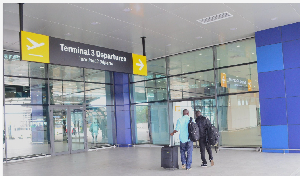A GNA feature by Christian Agubretu
Accra, Aug. 11, GNA - Government recently signed performance contract agreements with State Owned Enterprises (SOEs) with the understanding that they would work hard and efficiently to contribute significantly to the Consolidated Fund, from which they draw financial support.
Dr Kwabena Duffuor, Minister of Finance and Economic Planning, who signed on behalf of the Government, charged the enterprises to work out innovative strategies to pay their dividends to the state. The respected banker hit the nail at the right point. Others before him have made similar statements and yet the unprofitable way of doing business by SOEs, except for a few, has remained unchanged over the years.
One wonders what has been hindering SOEs from adopting sound business approaches in the management of their organizations. A former Minister of Finance and Economic Planning, the late Mr Kwadwo Baah-Wiredu, struck a similar strong chord on February 18, 2005, during the signing of performance agreement with SOEs. He said if SOEs became very productive and efficient it would result in the creation of more jobs which would help reduce the unemployment levels and increase the wealth of the nation. According to the late Minister, in 2005, out of the 13 SOEs that proposed to pay dividend as stated in their performance contracts, only three delivered.
In 2006, only six out of 10 SOEs lived up to expectation in the payment of dividends to the State. "This trend is not encouraging and therefore needs to change," he said.
Speaking at the 2008 Performance Contract Signing ceremony between the SOEs and Government, Mr Frank Ocran, former Executive Chairman of the State Enterprises Commission (SEC), similarly pointed out: "As of today only 23 SOEs have their accounts audited for 2005 and 10 SOEs have had theirs audited for 2006.
"This is certainly not good corporate governance practice and should be curtailed." He said at that moment, the SEC was waiting for audited accounts to enable it to complete its evaluation and selection of award winners for 2006 and 2007 operational years. Mr Ocran told the SOEs: "Each year, you're given billions of cedis and for you to sit down and not account for it is a very serious matter, which should not be toyed with."
Admittedly the issue of SOEs has become a chicken and egg affair. That is, if you give us the bait we will catch the fish. They say it is money that brings in more money. In other words, if SOEs were resourced they would be able to deliver.
Invariably, government continued to appoint Boards of Directors for these enterprises with the understanding that they would map out strategies that would make the SOEs profitable, and yet it is disheartening to see Board members taking sitting allowances, and considering their positions even as political patronage. What these board members have to do is chart ways of making the enterprises profitable. And with Parliament now firmly established, one cannot understand why a sub-committee on SOEs cannot be set up for chief executives and board chairmen to appear before the house to show reason why they should not be reprimanded if after a year of operation their respective enterprises fail to make profit.
Cronyism, political patronage, home-boyism, old boyism and girlism seem to have engulfed the country in the management of SOEs to the extent that those engaged to do the work professionally have had too many interferences in the discharge of their duties. Former President Jerry John Rawlings once said that it did not make economic sense to employ 10 drivers to a tractor. This seems to have permeated the management of SOEs.
John Ploughman, a famous English writer, also says sleeping on the bank of a river will not make you catch a fish. This philosophy seems to have been catching up with the management of SOEs because once people are appointed into office they go to "sleep" thinking that their un-baited hooks would catch a fish.
The enterprises say they need more capital for investment which the government does not always readily provide, yet these organizations rely on the Consolidated Fund for their wages, salaries, administration and service, sometimes forgetting that they have a duty to perform to the nation.
There is a certain ideological thinking that private ownership is the panacea to economic development. Yet, if it is capitalism that is the path to paradise then one wonders why PAN AM airways would collapse for more than 30 years, and how the whole world would be facing an economic meltdown today.
There are other schools of thought that a state enterprise operated purely on discipline, efficient managerial skills, devoid of cronyism and greed could succeed. That where others have failed others could succeed.
Many workers should count themselves lucky for being in employment in the face of the mass unemployment in the country; it is equally important for those employed to work hard to generate more employment for the less fortunate unemployed ones.
Former President John Agyekum Kufuor in pursuit of establishing the National Health Insurance Scheme was criticized for using part of the Social Security and National Insurance Trust (SSNIT) fund as seed money. He queried his critics if it was wrong to use money being made by those lucky to be working for the benefit of their less fortunate brothers and sisters who could not fend for themselves. Invariably, the inability of SOEs to make profit to pay dividend as agreed in their performance contracts with Government is neither here nor there. The success of an organization depends largely on leadership, financial autonomy, operational efficiency and effectiveness, improved customer service, good products - that is, what customers want. Given both situations one would be right to observe that there is something seriously wrong with the managerial acumen both on the part of Governments and Management.
Over the years, the designation of some organizations as state-owned has made them to believe that they could not turn corporations inside out and respond to business-like management. They have failed to perform on the premise that they are state owned and that they cannot make profit. Yet at the end of every year the same organizations have continued to sign performance agreements, and one keeps wondering what has ever happened to them when they fail to deliver. The same Managements rather remain at post just as the Rock of Gibraltar.
It would be recalled that on February 26, 2008, the then Government said it was carrying out rationalisation studies to identify institutions that would be removed from government subvention. It said that this would be done through full or partial commercialization of particular agencies/institutions, complete withdrawal of subvention or closure.
Under that arrang ement, the implementation of the Subvented Agencies Law, the memorandum of understanding signed with some organizations to validate transformation plans, select best options, determine cost and select intervention for support based on an anticipated impact on their sustainability, were to be reviewed. Amendments were also being made to primary legislations to make subvented agencies more corporate in nature, rationalize control procedures, increase managerial autonomy and alter the form, duties and responsibilities of boards of directors. The idea was to reduce their dependence on government subvention and at the same time improve their efficiency, productivity and accountability. In the opinion of this writer, a time has come to seize the bull by the horn.
Opinions of Thursday, 20 August 2009
Columnist: GNA














